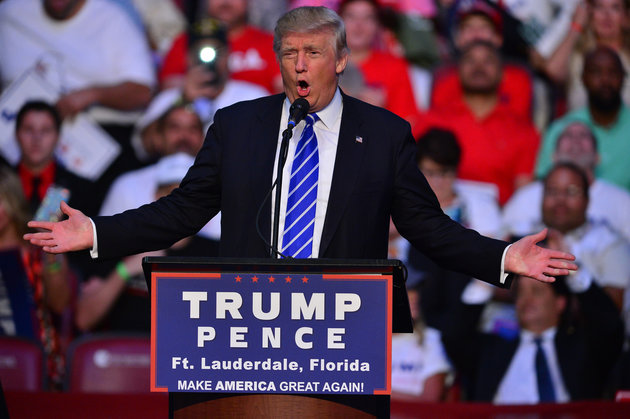
WASHINGTON ― Donald Trump’s latest attempt to weigh in on foreign policy discourse is his claim that President Barack Obama founded ISIS.
With the president currently overseeing a far-reaching air war against ISIS in multiple countries, Trump’s claim is one that clearly doesn’t need fact-checking. But, for the sake of argument, The Huffington Post asked several experts who have followed the rise of ISIS and asked them to explain who actually founded the infamous jihadi group.
It was a complex question, they said, and their answers varied. But no one said it was Obama.
The most straightforward answer came from Bruce Riedel, a veteran CIA analyst, who now heads the Brookings Intelligence Project. “ISIS is the descendant of al Qaida in Iraq founded by Abu Musaib al Zarqawi in 2003. Zarqawi remains the group’s martyred founder hero, lauded in ISIS propaganda,” Riedel wrote in an email.
Zarqawi, who was killed in a 2006 airstrike, wasn’t the type of guy you’d expect to head a jihadi organization, said Jessica Stern, a terrorism expert who co-wrote a book on ISIS and its tactics. “He was a secular thug whose mother wanted to save him from a life of crime and urged him to study Islam, to save him. He studied Islam, removed his tattoos, which are forbidden. He was virulently anti-Shiite, he beheaded his victims.” Zarqawi initiated the practices now employed by the group headed by Abu Bakr al-Baghdadi, Stern said.
The experts polled have apparently heard enough of Trump’s explosive claims to guess that what he meant to say is that Obama’s policies created an environment in which ISIS could thrive. (Trump defender Hugh Hewitt tried, in vain, to get the candidate to admit as much on Thursday, but Trump stuck to his initial response.)
While some who have studied ISIS extensively agree that Obama’s policies in Iraq and Syria worsened an already chaotic situation, there was near unanimous agreement that the 2003 invasion of Iraq most directly triggered the rise of ISIS.
“If there is an American President who bears responsibility for creating what is today ISIS it would be George W. Bush for invading Iraq and thus producing [Al Qaeda],” Riedel said.
The rise of ISIS can be traced back to the civil war between Shiites and Sunnis in Iraq, sparked by the U.S. invasion, which toppled Saddam Hussein’s regime, said Vali Nasr, the dean of the Johns Hopkins School of Advanced International Studies. “Sunnis in Iraq were not reconciled to losing power ― to the rise of a Shiite government in Iraq,” Nasr said. It was in the subsequent insurgency that Sunnis who went on to join ISIS “honed their ideology and political relevance in the region,” he continued.
“We fired all of the Baathists who had been working with Saddam,” Stern added. “Suddenly there are military personnel and intelligence operatives who don’t have jobs, but have guns. … They were ripe for recruitment.”
But Stern also faults Obama for being too eager to distance himself from Bush’s ill-fated war, without fully considering the consequences of pulling military and diplomatic resources from the country.
“Obama was elected on a mandate to get of Iraq. … But just because it was a mistaken policy doesn’t mean that it’s easy to rectify the situation. We left Iraq in the hands of a sectarian leader,” Stern said, referring to former Prime Minister Nouri al-Maliki, a Shiite leader whose leadership ignited widespread resentment within the country’s Sunni community. “And that did create an opening for jihadis.”
Shadi Hamid, a senior fellow at the Brookings Institution, cited Obama’s restrained policy in Syria as more consequential to ISIS’s rise than the withdrawal from Iraq. “I’d argue that Obama’s unwillingness to confront the Assad regime was a boon for ISIS because Assad’s atrocities made ISIS more appealing. ISIS was able to present itself as a defender of Sunnis,” Hamid said. “But it’s unclear how much of that Trump is aware of.”
Hamid said he would welcome closer scrutiny of the foreign policy decisions made by both Bush and Obama ― and the ways in which they directly or indirectly allowed jihadism to expand in the Middle East. “But we’re not having that conversation, because you have stupid, simplistic arguments which don’t really even make any sense from someone like Donald Trump. It’s kind of a missed opportunity for the Republicans.”


